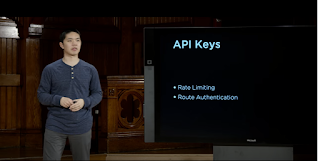Finished the last lecture of the CS50 HTML series, with the discussion
on security concerns one needs to keep in mind during Web design.This was
very informative - enligtening - to me.
The code below shows howeasy it is to create a false link. The user is clicking
on Google.com but the links that gets activated is that of the course site. That easy...
And who hasn't had the experience of ending up on an unexpected place on the Web,
or clicking for what one thinks is information to end up on a paid course link etc.
Below, we are directed to a false Bank of America site ( just check on the url at the
top of the page. This too was easy; just copy/paste the html from the real BOA site,
available through 'view source code'. a person might just type in their account password.
This is called a phishing attack.
So what can be done. Any sensitive information going on the Web needs to be encrypted ie
not be sent as is, but translated into something else, with the aid of a key whichthe receiver can then
use torestitute the original message. Problem is , sending the key along with the message is also
dangerous. The solution: a doubel key approach. The receiver send a publickey to the sender,
who encodes his information with. The information is then restored with a private key held by
the receiver of the message only. Very clever!!
Passwords are best stored as hash values (a communication of any length stored in a fixed
length sries. One cannot restore the original from the hash but the same original yet always
generates the same hash. A sitecannot tell you what your forgotten password was; but can help you
generate a new one).
API keys serve to limit how much communication can occur between two services ( thus
avoiding denial of serviceattacks, where a site is deluged withrequest). These can also
monitor the authenticity of requests.
Using 'get' posts is dangerous, because others can 'get' postings such as banking information.
Post is safer, only so much so. in effect, someone can sneak in a request for a money transfer.
Django protects form this with the use of a token:






No comments:
Post a Comment